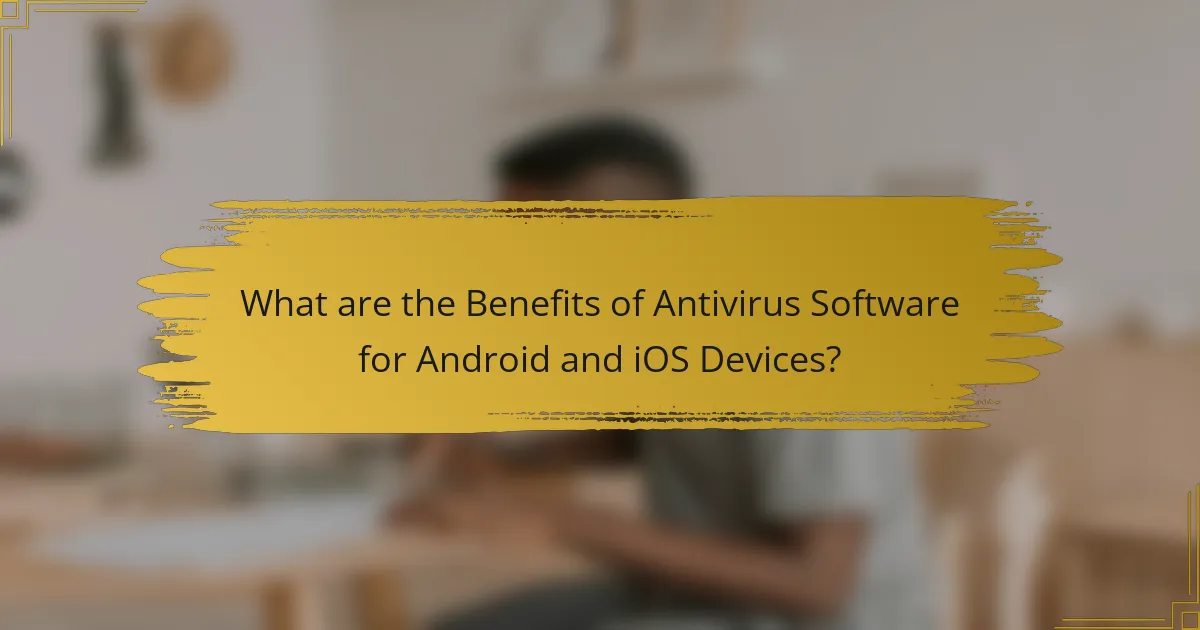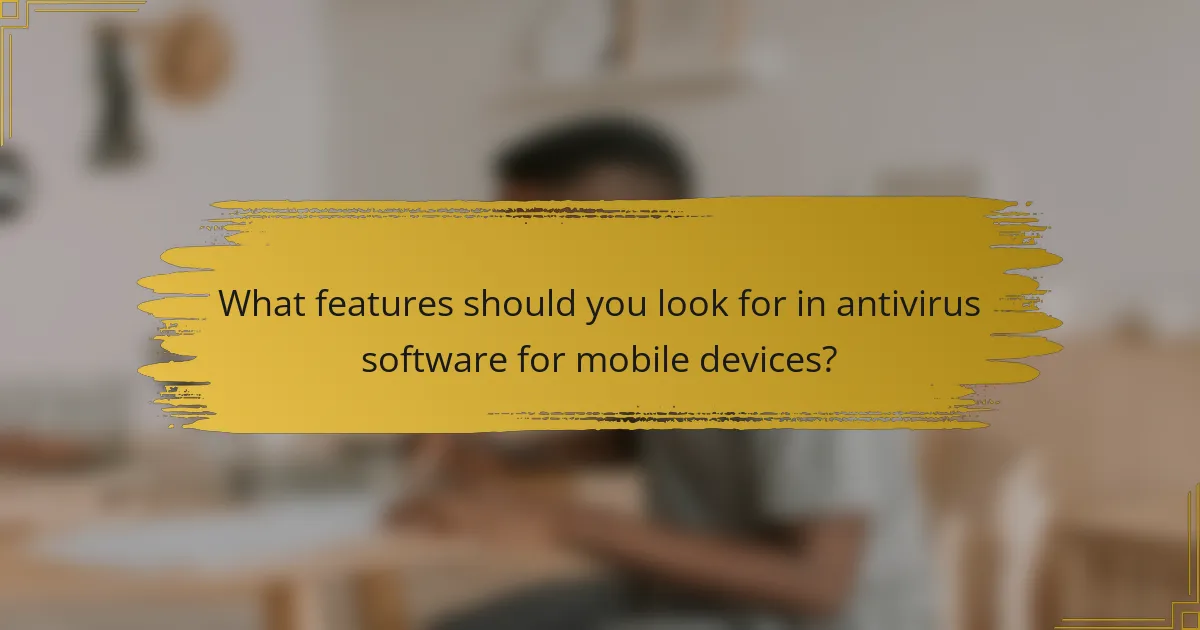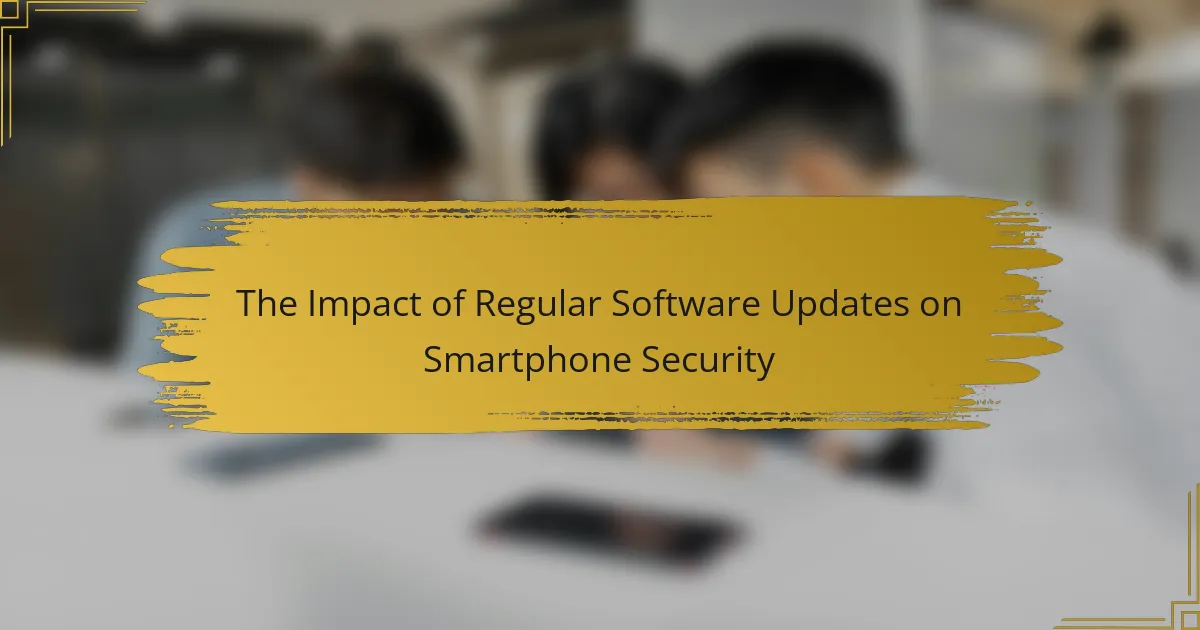Antivirus software for Android and iOS devices is crucial for protecting against malware and cyber threats. This software detects and removes harmful applications, offering features like real-time scanning, web protection, and phishing detection to safeguard personal data. Regular updates enhance its ability to combat the latest threats, while anti-theft capabilities help locate lost devices and secure sensitive information. Key features to consider include malware protection, real-time scanning, and privacy safeguards, all of which contribute to comprehensive mobile security.

What are the Benefits of Antivirus Software for Android and iOS Devices?
Antivirus software for Android and iOS devices provides essential protection against malware and cyber threats. It helps to detect and remove harmful applications that can compromise device security. Antivirus software also offers real-time scanning to monitor for suspicious activities. This software can protect personal data from theft and unauthorized access. Many antivirus solutions include features like web protection and phishing detection. They can also provide secure browsing experiences by blocking malicious websites. Regular updates ensure that the software can combat the latest threats effectively. According to a report by AV-Test, mobile devices without antivirus software are three times more likely to be infected by malware.
How does antivirus software protect mobile devices?
Antivirus software protects mobile devices by detecting and removing malware. It scans applications and files for harmful code. This software also monitors real-time activity to prevent threats. It blocks malicious websites and phishing attempts. Regular updates keep the software effective against new threats. According to a study by AV-Test, 99% of malware can be detected by top antivirus solutions. These features collectively enhance the security of mobile devices.
What types of threats does antivirus software defend against?
Antivirus software defends against various types of threats. These include malware, which encompasses viruses, worms, and Trojans. It also protects against spyware that can track user activity. Ransomware is another threat, which encrypts files and demands payment for access. Phishing attacks are targeted attempts to steal sensitive information. Additionally, antivirus software guards against adware that displays unwanted advertisements. It can also detect rootkits that exploit system vulnerabilities. Overall, antivirus software provides comprehensive protection against these and other cybersecurity threats.
How does antivirus software detect and remove malware?
Antivirus software detects and removes malware through various methods. It uses signature-based detection, which identifies known malware by matching it against a database of signatures. Heuristic analysis is another method, analyzing the behavior of files to identify suspicious activity. Real-time scanning monitors system activity to detect malware as it occurs. Once detected, antivirus software quarantines the malware to prevent further damage. It then removes the malware, restoring affected files if possible. According to AV-Test, effective antivirus programs can block over 99% of known malware threats.
Why is antivirus software essential for mobile security?
Antivirus software is essential for mobile security because it protects devices from malware and cyber threats. Mobile devices are increasingly targeted by malicious software, which can lead to data breaches and identity theft. According to a report by McAfee, mobile malware attacks increased by 50% in 2020. Antivirus software detects and removes harmful applications before they can cause damage. It also provides real-time scanning to identify threats as they arise. Moreover, many antivirus solutions offer additional features like anti-theft protection and secure browsing. These features enhance overall security and safeguard sensitive information. Thus, antivirus software plays a crucial role in maintaining mobile security.
What are the risks of not using antivirus software on mobile devices?
Not using antivirus software on mobile devices exposes users to various risks. These risks include malware infections that can steal personal data. Without protection, devices become vulnerable to phishing attacks. Cybercriminals may exploit unprotected devices to access sensitive information. Additionally, users may experience performance issues due to malicious software. Unsecured devices can also be used in botnets for larger attacks. The absence of antivirus software increases the likelihood of identity theft. According to a report by Symantec, mobile malware attacks increased by 54% in 2019. This statistic highlights the growing threat to unprotected mobile devices.
How does mobile security differ from traditional security measures?
Mobile security differs from traditional security measures primarily due to the unique vulnerabilities of mobile devices. Traditional security often focuses on protecting static systems like servers and desktops. Mobile devices, however, are portable and frequently connect to various networks, increasing exposure to threats.
Mobile security emphasizes application security, as many threats originate from third-party apps. According to a 2021 report by Symantec, 1 in 36 mobile devices had high-risk applications installed. Additionally, mobile security must address issues like device loss and theft, which are less common for traditional systems.
Moreover, mobile security often includes features like remote wipe and location tracking, which are not typically part of traditional security. The dynamic nature of mobile environments requires continuous monitoring and updates to address evolving threats effectively.

What features should you look for in antivirus software for mobile devices?
Look for features such as malware protection, real-time scanning, and anti-theft capabilities in antivirus software for mobile devices. Malware protection identifies and removes harmful applications. Real-time scanning continuously monitors downloads and app installations for threats. Anti-theft capabilities help locate lost devices and remotely wipe data. Additional features may include safe browsing tools and privacy protection. These features enhance security and safeguard personal information on mobile devices.
What are the key functionalities of effective antivirus software?
Effective antivirus software provides real-time protection against malware. It scans files and applications for potential threats before they can cause harm. Regular updates ensure the software recognizes the latest viruses and vulnerabilities. It also includes features like email scanning to detect malicious attachments. Another functionality is web protection, which blocks access to harmful websites. Some antivirus programs offer a firewall to monitor incoming and outgoing traffic. Additionally, they may provide a secure VPN for enhanced privacy. According to AV-Test, effective antivirus solutions can reduce malware infection rates by over 90%.
How does real-time scanning enhance security?
Real-time scanning enhances security by continuously monitoring devices for threats. It detects malware, viruses, and other malicious activities as they occur. This immediate detection allows for prompt action to mitigate risks. For instance, a study by AV-Test found that real-time scanning can block up to 99% of malware attacks. By identifying threats in real-time, users can avoid data breaches and protect sensitive information. Additionally, real-time scanning updates its threat database regularly, ensuring protection against the latest threats. This proactive approach significantly reduces the likelihood of infections and enhances overall device security.
What role does privacy protection play in antivirus software?
Privacy protection is a crucial role of antivirus software. It safeguards users’ personal data from unauthorized access. Antivirus programs detect and block malware that may exploit privacy vulnerabilities. They also secure sensitive information during online transactions. Many antivirus solutions offer features like secure browsing and VPN services. These features enhance user anonymity and protect against data leaks. According to a 2021 study by AV-TEST, 80% of users prioritize privacy features in antivirus software. This highlights the importance of privacy protection in maintaining user trust and security.
How do user reviews and ratings influence antivirus software choice?
User reviews and ratings significantly influence antivirus software choice. Consumers often rely on the experiences of others to gauge effectiveness and reliability. High ratings can enhance a product’s credibility, leading to increased downloads. Conversely, negative reviews can deter potential users. According to a survey by BrightLocal, 91% of consumers read online reviews before making a decision. This statistic underscores the importance of user feedback in shaping perceptions. Furthermore, detailed reviews provide insights into specific features and performance, guiding users toward informed choices. Overall, user reviews and ratings play a crucial role in the decision-making process for antivirus software.
What should you consider when evaluating user feedback?
When evaluating user feedback, consider the relevance, consistency, and clarity of the comments. Relevance ensures feedback directly pertains to antivirus software features. Consistency involves checking if multiple users report similar issues or praises. Clarity helps in understanding user sentiments without ambiguity. Analyze quantitative data, such as star ratings, alongside qualitative comments for a comprehensive view. This approach allows for identifying common trends and specific areas for improvement in antivirus software.

How can you maximize the benefits of antivirus software on your mobile device?
To maximize the benefits of antivirus software on your mobile device, regularly update the software. Frequent updates ensure that the antivirus can combat the latest threats. Enable real-time scanning to detect and block malware instantly. Utilize features like web protection to avoid malicious websites. Schedule regular scans for comprehensive security checks. Use the app’s privacy features to secure personal data. Review app permissions to limit access to sensitive information. Lastly, educate yourself on phishing tactics to avoid falling victim to scams.
What best practices should you follow for antivirus software usage?
Use antivirus software regularly to protect devices from malware. Regularly update the antivirus software to ensure it can detect the latest threats. Schedule automatic scans to identify and remove potential threats. Enable real-time protection for ongoing monitoring of suspicious activities. Avoid downloading apps from untrusted sources, as they may contain malware. Review app permissions to ensure they are necessary and appropriate. Back up important data regularly to prevent loss in case of infection. Educate yourself about phishing attempts to avoid falling victim to scams.
How often should you update your antivirus software?
You should update your antivirus software at least once a week. Regular updates ensure that your software can defend against the latest threats. Cyber threats evolve rapidly, with new viruses and malware emerging daily. According to cybersecurity experts, weekly updates provide a strong defense against these evolving threats. Additionally, many antivirus programs offer automatic updates. This feature helps maintain protection without requiring manual intervention. Keeping your antivirus updated is crucial for optimal device security.
What are the common troubleshooting tips for antivirus software on mobile devices?
Common troubleshooting tips for antivirus software on mobile devices include restarting the device. This can resolve temporary glitches affecting the software. Ensure the antivirus app is updated to the latest version, as updates often fix bugs and improve performance. Check for compatibility issues with the device’s operating system. Uninstalling and reinstalling the antivirus app can also help if it is malfunctioning. Clearing the app cache may resolve slow performance or errors. Additionally, verify that device settings allow the antivirus to function correctly. Finally, consult the antivirus provider’s support resources for specific guidance tailored to the software.
Antivirus software for Android and iOS devices is essential for protecting against malware and cyber threats, offering features such as real-time scanning, web protection, and phishing detection. The software detects and removes harmful applications, safeguarding personal data from theft and unauthorized access. Key functionalities include signature-based detection, heuristic analysis, and regular updates to combat evolving threats. The article also highlights the risks of not using antivirus software, the importance of privacy protection, and best practices for maximizing the software’s benefits on mobile devices.



